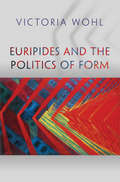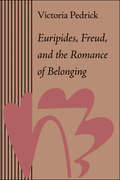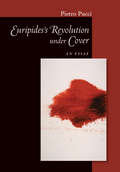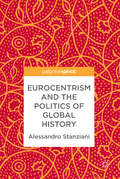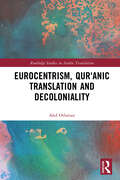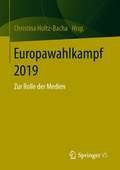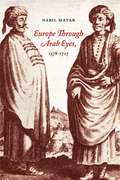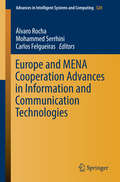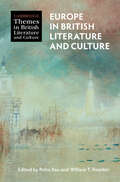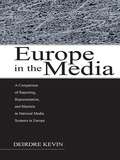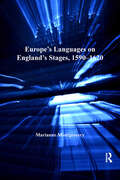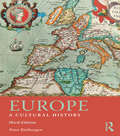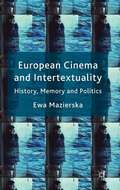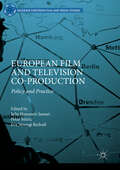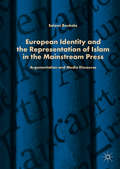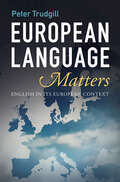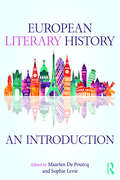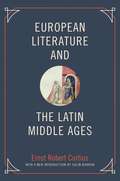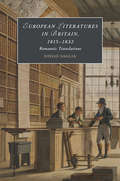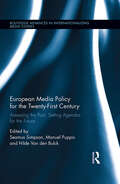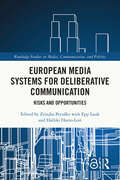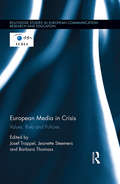- Table View
- List View
Euripides and the Politics of Form
by Victoria WohlHow can we make sense of the innovative structure of Euripidean drama? And what political role did tragedy play in the democracy of classical Athens? These questions are usually considered to be mutually exclusive, but this book shows that they can only be properly answered together. Providing a new approach to the aesthetics and politics of Greek tragedy, Victoria Wohl argues that the poetic form of Euripides' drama constitutes a mode of political thought. Through readings of select plays, she explores the politics of Euripides' radical aesthetics, showing how formal innovation generates political passions with real-world consequences. Euripides' plays have long perplexed readers. With their disjointed plots, comic touches, and frequent happy endings, they seem to stretch the boundaries of tragedy. But the plays' formal traits--from their exorbitantly beautiful lyrics to their arousal and resolution of suspense--shape the audience's political sensibilities and ideological attachments. Engendering civic passions, the plays enact as well as express political ideas. Wohl draws out the political implications of Euripidean aesthetics by exploring such topics as narrative and ideological desire, the politics of pathos, realism and its utopian possibilities, the logic of political allegory, and tragedy's relation to its historical moment.Breaking through the impasse between formalist and historicist interpretations of Greek tragedy, Euripides and the Politics of Form demonstrates that aesthetic structure and political meaning are mutually implicated--and that to read the plays poetically is necessarily to read them politically.
Euripides, Freud, and the Romance of Belonging
by Victoria PedrickFreud's interpretation of the ancient legend of Oedipus—as formulated in Sophocles' tragic drama—is among the most widely known concepts of psychoanalysis. Euripides' Ion, however, presents a more complex version of the development of personal identity. Here, the discovery of family origins is a process in which parent and child both take part as distinct agents driven by their own impulses of violence and desire.Euripides, Freud, and the Romance of Belonging studies the construction of identity and the origins of the primal trauma in two texts, the Ion and Freud’s case history of the Wolf Man. Victoria Pedrick challenges the conventional psychoanalytic theory of the development of the individual within the family, presenting instead a richer and more complex economy of exchange between the parent and the child. She provides a new perspective on Freud's appropriation of ancient texts and moves beyond the familiar reunion in Oedipus to the more nuanced scene of abandonment present in Ion. Her parallel investigation of these texts suggests that contemporary culture remains preoccupied by the problems of the past in the determination of identity.Pedrick's fresh perspectives on both texts as well as on their relationship to each other shed new light on two foundational moments in the intellectual development of the West: Greek tragedy and Freudian psychoanalysis.
Euripides: Hecuba (Cambridge Greek And Latin Classics )
by Luigi Battezzato EuripedesHecuba was the most widely read play of Euripides from antiquity to the Renaissance, appealing to readers and spectators for its controversial treatment of moral themes: revenge, war and slavery, violence, human sacrifice, gender and ethnic relations. <P><P>It narrates the death of Hecuba's daughter Polyxena, sacrificed by the Greeks to placate the ghost of Achilles, and that of her son Polydorus, killed out of greed by the Thracian king who was supposed to protect him. Hecuba successfully plots a cruel and shocking revenge against the killer. <P>The play is now at the centre of the attention of scholars and performing artists. This edition offers new textual and interpretive suggestions, and provides detailed guidance on problems of language as well as employing conceptual tools from contemporary linguistics. It will be useful for upper-level undergraduates and graduate students, as well as of interest to scholars.
Euripides’ Revolution under Cover: An Essay (Cornell Studies in Classical Philology #65)
by Pietro PucciIn this provocative book, Pietro Pucci explores what he sees as Euripides's revolutionary literary art. While scholars have long pointed to subversive elements in Euripides’s plays, Pucci goes a step further in identifying a Euripidean program of enlightened thought enacted through carefully wrought textual strategies. The driving force behind this program is Euripides’s desire to subvert the traditional anthropomorphic view of the Greek gods—a belief system that in his view strips human beings of their independence and ability to act wisely and justly. Instead of fatuous religious beliefs, Athenians need the wisdom and the strength to navigate the challenges and difficulties of life.Throughout his lifetime, Euripides found himself the target of intense criticism and ridicule. He was accused of promoting new ideas that were considered destructive. Like his contemporary, Socrates, he was considered a corrupting influence. No wonder, then, that Euripides had to carry out his revolution "under cover." Pucci lays out the various ways the playwright skillfully inserted his philosophical principles into the text through innovative strategies of plot development, language and composition, and production techniques that subverted the traditionally staged anthropomorphic gods.
Eurocentrism and the Politics of Global History
by Alessandro StanzianiGlobal history locates national histories in the context of broader processes, in which the West is not necessarily synonymous with progress. And yet it often suffers from the same Eurocentrism that plagues national history, accepting Western categories and values uncritically and largely ignoring non-English historiographies. Alessandro Stanziani examines these tensions and asks what global history is and ought to be. Drawing upon a wide array of sources, he historicizes global history writing from the sixteenth century onward, tracing the forces of revolution, globalization, totalitarianism, colonization, decolonization and the Cold War. By considering global history in the context of a longue durée, multipolar perspective, this book assesses the strengths and limits of the field, and clarifies what is at stake.
Eurocentrism, Qurʾanic Translation and Decoloniality (Routledge Studies in Arabic Translation)
by Ahd OthmanEurocentrism, Qurʾanic Translation and Decoloniality contributes to the understanding of Eurocentrism in Translation Studies and engages with the concept through the lens of scholarship on Arabic and Qurʾan translation.This book calls for a deeper consideration of Eurocentrism as essential for several debates in the discipline, including its scientific character and future development. It claims that the angle of Arabic and Qurʾan translation is a valuable – and nearly unexploited – area where tensions in translation scholarship can play out in revealing ways. The book also draws connections between Eurocentrism, Qurʾan translation and decolonial thought in order to highlight ‘decoloniality’ as a useful framework for imagining a post-Eurocentric discipline.The book will appeal to scholars and postgraduate students and researchers interested in Translation Studies, particularly within the areas of Arabic, Qurʾanic, Islamic and religious translation.
Europawahlkampf 2019: Zur Rolle der Medien
by Christina Holtz-BachaDer Band versammelt Beiträge, die Befunde aus Untersuchungen zum Europawahlkampf 2019 in und mit den traditionellen und den neuen Medien präsentieren. In Anbetracht des Erstarkens rechtspopulistischer Parteien und des Nationalismus galt die Europawahl 2019 als Schicksalswahl für Europa, was für den Wahlkampf ein besonderes Engagement auf Seiten der Politik wie auch der Medien erwarten ließ. Gegenüber dem Europawahlkampf 2014 kam zudem den sozialen Netzwerken gesteigerte Bedeutung zu, die den politischen Akteuren ein zusätzliches Kampagneninstrument bieten, aber auch den Wahlkampf abseits der öffentlichen Beobachtung ermöglichen.
Europe Through Arab Eyes, 1578-1727
by Nabil MatarTraveling to archives in Tunisia, Morocco, France, and England, with visits to Egypt, Jordan, Lebanon, and Spain, Nabil Matar assembles a rare history of Europe's rise to power as seen through the eyes of those who were later subjugated by it. Many historians of the Middle East believe Arabs and Muslims had no interest in Europe during this period of Western discovery and empire, but in fact these groups were very much engaged with the naval and industrial development, politics, and trade of European Christendom. Beginning in 1578 with a major Moroccan victory over a Portuguese invading army, Matar surveys this early modern period, in which Europeans and Arabs often shared common political, commercial, and military goals. Matar concentrates on how Muslim captives, ransomers, traders, envoys, travelers, and rulers pursued those goals while transmitting to the nonprint cultures of North Africa their knowledge of the peoples and societies of Spain, France, Britain, Holland, Italy, and Malta. From the first non-European description of Queen Elizabeth I to early accounts of Florence and Pisa in Arabic, from Tunisian descriptions of the Morisco expulsion in 1609 to the letters of a Moroccan Armenian ambassador in London, the translations of the book's second half draw on the popular and elite sources that were available to Arabs in the early modern period. Letters from male and female captives in Europe, chronicles of European naval attacks and the taqayid (newspaper) reports on Muslim resistance, and descriptions of opera and quinine appear here in English for the first time. Matar notes that the Arabs of the Maghrib and the Mashriq were eager to engage Christendom, despite wars and rivalries, and hoped to establish routes of trade and alliances through treaties and royal marriages. However, the rise of an intolerant and exclusionary Christianity and the explosion of European military technology brought these advances to an end. In conclusion, Matar details the decline of Arab-Islamic power and the rise of Britain and France.
Europe Through Arab Eyes, 1578–1727
by Nabil MatarTraveling to archives in Tunisia, Morocco, France, and England, with visits to Egypt, Jordan, Lebanon, and Spain, Nabil Matar assembles a rare history of Europe's rise to power as seen through the eyes of those who were later subjugated by it. Many historians of the Middle East believe Arabs and Muslims had no interest in Europe during this period of Western discovery and empire, but in fact these groups were very much engaged with the naval and industrial development, politics, and trade of European Christendom. Beginning in 1578 with a major Moroccan victory over a Portuguese invading army, Matar surveys this early modern period, in which Europeans and Arabs often shared common political, commercial, and military goals. Matar concentrates on how Muslim captives, ransomers, traders, envoys, travelers, and rulers pursued those goals while transmitting to the nonprint cultures of North Africa their knowledge of the peoples and societies of Spain, France, Britain, Holland, Italy, and Malta. From the first non-European description of Queen Elizabeth I to early accounts of Florence and Pisa in Arabic, from Tunisian descriptions of the Morisco expulsion in 1609 to the letters of a Moroccan Armenian ambassador in London, the translations of the book's second half draw on the popular and elite sources that were available to Arabs in the early modern period. Letters from male and female captives in Europe, chronicles of European naval attacks and the taqayid (newspaper) reports on Muslim resistance, and descriptions of opera and quinine appear here in English for the first time. Matar notes that the Arabs of the Maghrib and the Mashriq were eager to engage Christendom, despite wars and rivalries, and hoped to establish routes of trade and alliances through treaties and royal marriages. However, the rise of an intolerant and exclusionary Christianity and the explosion of European military technology brought these advances to an end. In conclusion, Matar details the decline of Arab-Islamic power and the rise of Britain and France.
Europe and MENA Cooperation Advances in Information and Communication Technologies
by Álvaro Rocha Mohammed Serrhini Carlos FelgueirasThis book contains a selection of articles from The Europe, Middle East and North Africa Conference on Technology and Security to Support Learning 2016 (EMENA-TSSL'16), held between the 3th and 5th of October at Saidia, Oujda, Morocco. EMENA-TSSL'16 is a global forum for researchers and practitioners to present and discuss recent results and innovations, current trends, professional experiences and challenges in Information & Communication Technologies, and Security to support Learning. The main topics covered are: A) Online Education; B) Emerging Technologies in Education; C) Artificial Intelligence in Education; D) Gamification and Serious games; E) Network & Web Technologies Applications; F) Online experimentation and Virtual Laboratories; G) Multimedia Systems and Applications; H) Security and Privacy; I) Multimedia, Computer Vision and Image Processing; J) Cloud, Big Data Analytics and Applications; K) Human-Computer Interaction; L) Software Systems, Architectures, Applications and Tools; M) Online Languages and Natural Language Processing N) E-content Development, Assessment and Plagiarism; O) Secure E-Learning Development and Auditing; P) Internet of Things and Wireless Sensor Networks.
Europe in British Literature and Culture (Cambridge Themes in British Literature and Culture)
by Petra Rau William T. RossiterHow has Europe shaped British literature and culture – and vice versa – since the Middle Ages? This volume offers nuanced answers to this question. From the High Renaissance to haute cuisine, from the Republic of Letters to the European Union, from the Black Death to Brexit -- the reader gains insights into the main geographical zones of influence, shared intellectual movements, indicative modes of cultural transfer and more recent conflicts that have left their mark on the British-European relationship. The story that emerges from this long history of cultural interactions is much more complex than its most recent political episode might suggest. This volume offers indispensable contexts to the manifold and longstanding connections between British and European literature and culture. This book suggests that, however the political landscape develops, we will do well to bear this exceptionally rich history in mind.
Europe in the Media: A Comparison of Reporting, Representation, and Rhetoric in National Media Systems in Europe (European Institute for the Media Series)
by Deirdre KevinEurope in the Media draws together the results of several research projects that examined media coverage of European political and cultural affairs and media representations of Europe. The book attempts to outline some of the important debates regarding European integration and to describe the media landscape in which these debates are informed, reflected, and facilitated. The research presented sought to answer several questions, namely the role of the media in the democratic process at the European level and the extent to which the media contributes to and reflects the process of European integration. The book provides a wide scope of comparative analysis, allowing for an extremely interesting overview of the way that national media systems in France, Germany, Ireland, Italy, the Netherlands, Poland, Spain, Sweden, and the United Kingdom approach the issue of European integration. Based on the news output of over 50 media outlets in eight countries, this book contains the original data gathered by experts during two 1-week monitoring periods, as well as data that was collected and coded by experts with reference to the programming of more than 12 major broadcasters in six countries. This volume addresses debates and analysis from the fields of political science in relation to the process of European integration, EU policymaking and public participation and opinion-formation. It also outlines relevant media theory regarding the relationships between the media and democracy, and the media and identity formation. In this way, the book provides a valuable link between these two separate fields of investigation in an area that is of increasing interest to academics, students, politicians, and journalists.
Europe's Languages on England's Stages, 1590–1620 (Studies In Performance And Early Modern Drama Ser.)
by Marianne MontgomeryThough representations of alien languages on the early modern stage have usually been read as mocking, xenophobic, or at the very least extremely anxious, listening closely to these languages in the drama of Shakespeare and his contemporaries, Marianne Montgomery discerns a more complex reality. She argues instead that the drama of the early modern period holds up linguistic variety as a source of strength and offers playgoers a cosmopolitan engagement with the foreign that, while still sometimes anxious, complicates easy national distinctions. The study surveys six of the European languages heard on London's commercial stages during the three decades between 1590 and 1620-Welsh, French, Dutch, Spanish, Irish and Latin-and the distinct sets of cultural issues that they made audible. Exploring issues of culture and performance raised by representations of European languages on the stage, this book joins and advances two critical conversations on early modern drama. It both works to recover English relations with alien cultures in the period by looking at how such encounters were staged, and treats sound and performance as essential to understanding what Europe's languages meant in the theater. Europe's Languages on England's Stages, 1590-1620 contributes to our emerging sense of how local identities and global knowledge in early modern England were necessarily shaped by encounters with nearby lands, particularly encounters staged for aural consumption.
Europe: A Cultural History
by Peter RietbergenThis third, revised and augmented edition of Peter Rietbergen's highly acclaimed Europe: A Cultural History provides a major and original contribution to the study of Europe. From ancient Babylonian law codes to Pope Urban's call to crusade in 1095, and from Michelangelo on Italian art in 1538 to Sting's songs in the late twentieth century, the expressions of the culture that has developed in Europe are diverse and wide-ranging. This exceptional text expertly connects this variety, explaining them to the reader in a thorough and yet highly readable style. Presented chronologically, Europe: A Cultural History examines the many cultural building blocks of Europe, stressing their importance in the formation of the continent's ever-changing cultural identities. Starting with the beginnings of agricultural society and ending with the mass culture of the early twenty-first century, the book uses literature, art, science, technology and music to examine Europe's cultural history in terms of continuity and change. Rietbergen looks at how societies developed new ways of surviving, believing, consuming and communicating throughout the period. His book is distinctive in paying particular attention to the ways early Europe has been formed through the impact of a variety of cultures, from Celtic and German to Greek and Roman. The role of Christianity is stressed, but as a contested variable, as are the influences from, for example, Asia in the early modern period and from American culture and Islamic immigrants in more recent times. Since anxieties over Europe's future mount, this third edition text has been thoroughly revised for the late twentieth and early twenty-first centuries. Moreover, it now also includes a 'dossier' of some seventeen essay-like vignettes that highlight cultural phenomena said to be characteristic of Europe: social solidarity, capitalism, democracy and so forth. With a wide selection of illustrations, maps, excerpts of sources and even lyrics from contemporary songs to support the arguments, this book both serves the general reader as well as students of historical and cultural studies.
European Cinema and Intertextuality
by Ewa MazierskaThis bookoffers an up-to-date approach to the question of representing history through film, exploring howfilms represent crucial eventsintwentieth-century European history. This includes the Second World War, Armenian Genocide, anti-Semitic attacks in Poland, European terrorism of the 1970s, and the end of communism. "
European Constitutional Language
by András JakabIf the task of constitutional theory is to set out a language in which the discourse of constitutional law may be grounded, a question of the utmost importance is how this terminology is created, defined and interpreted. In this groundbreaking new work, András Jakab maps out and analyses the grammar and vocabulary on which the core European traditions of constitutional theory are based. He suggests understanding key constitutional concepts as responses to historical and present day challenges experienced by European societies. Drawing together a great and diverse range of literature, much of which has never before been touched upon by scholarship in the English language, Jakab reconceptualises and argues for a new understanding of European constitutional law discourse. In so doing he shines new light on what constitutes its distinctively European nature. This remarkable book is essential reading for all scholars and students of constitutional theory in Europe and beyond.
European Film and Television Co-production: Policy and Practice (Palgrave European Film and Media Studies)
by Eva Novrup Redvall Julia Hammett-Jamart Petar MitricThis volume offers an up-to-date analysis of film and television co-production in Europe. It brings together the voices of policy professionals, industry practitioners and media industry scholars to trace the contours of a complex practice that is of increasing significance in the global media landscape. Analysis of the latest production statistics sits alongside interviews with producers and the critical evaluation of public film policies. The volume incorporates contributions from representatives of major public institutions—Eurimages, the European Audiovisual Observatory and the European Commission—and private production companies including the pan-European Zentropa Group. Policy issues are elucidated through case studies including the Oscar-winning feature film Ida, the BAFTA-winning I am not a Witch and the Danish television serial Ride Upon the Storm. Scholarly articles span co-development, co-distribution and regional cinemas as well as emerging policy challenges such as the digital single market. The combination of qualitative and quantitative approaches, and the juxtaposition of industry and scholarly voices, provides a unique perspective on European co-production that is information-rich, complex and stimulating, making this volume a valuable companion for students, scholars, and industry professionals.
European Identity and the Representation of Islam in the Mainstream Press: Argumentation and Media Discourse
by Salomi BoukalaThis book combines media studies and linguistics with theories of national and supranational identity to offer an interdisciplinary approach to the study of European identity/ies and news discourses. Taking representations of ‘Islamist terrorism’ and Turkey’s accession to the European Union as case studies, it analyses the discursive construction of supranational European identity through the discursive distinction of ‘Us’ and ‘Them’. Moreover, it compares the media’s representations of the ‘Other’ in different socio-political moments in Europe- from times of European integration (2004-5) to the European dystopia (2015-16) through the discourse analysis of specific Greek, British and French newspapers. This timely work synthesizes classic argumentative approaches and Gramscian thought in the study of media discourses by focusing on the Aristotelian concept of topos and introducing the concept of ‘hegemonic knowledge’. This pioneering work will appeal to scholars across the fields of linguistics, social anthropology, European politics, and media studies.
European Language Matters: English in Its European Context
by Peter TrudgillWhy do Greek lorries have Metaphores written on the side? Is it grammatically correct to say 'the best team won' after a football match? What is the difference between manly, male, masculine and macho? Bringing together Peter Trudgill's highly popular columns for the New European, this fascinating collection explores how English has been influenced, both linguistically and culturally, by its neighbouring languages in Europe. English is very much a European language and Trudgill delves in to the rich linguistic legacy that links all European languages. The bite-sized pieces are grouped together in thematically arranged sections, to allow the reader to dip in and out at will, and cover a wide range of topics, from the etymology of words, to illuminating pieces on grammar. Written in an engaging and lively style, both language specialists and general readers with no prior experience will uncover intriguing facts about language and languages in Europe.
European Literary History: An Introduction
by Maarten De Pourcq Sophie LevieThis clear and engaging book offers readers an introduction to European Literary History from antiquity through to the present day. Each chapter discusses a short extract from a literary text, whilst including a close reading and a longer essay examining other key texts of the period and their place within European Literature. Offering a view of Europe as an evolving cultural space and examining the mobility and travel of literature both within and out of Europe, this guide offers an introduction to the dynamics of major literary networks, international literary networks, publication cultures and debates, and the cultural history of 'Europe' as a region as well as a concept.
European Literature and the Latin Middle Ages (Bollingen Series #180)
by Ernst Robert CurtiusPublished just after the Second World War, European Literature and the Latin Middle Ages is a sweeping exploration of the remarkable continuity of European literature across time and place, from the classical era up to the early nineteenth century, and from the Italian peninsula to the British Isles. In what T. S. Eliot called a "magnificent" book, Ernst Robert Curtius establishes medieval Latin literature as the vital transition between the literature of antiquity and the vernacular literatures of later centuries. The result is nothing less than a masterful synthesis of European literature from Homer to Goethe. European Literature and the Latin Middle Ages is a monumental work of literary scholarship. In a new introduction, Colin Burrow provides critical insights into Curtius's life and ideas and highlights the distinctive importance of this wonderful book.
European Literatures in Britain, 18–15–1832: Romantic Translations (Cambridge Studies in Romanticism #123)
by Diego SagliaStudies of British Romanticism have traditionally tended to envisage it as an intensely local, indeed insular, phenomenon. Yet, just as the seemingly isolated British Isles became more and more central in international geo-political and economic contexts between the 1780s and the 1830s, so too literature and culture were characterized by an increasingly close and relevant dialogue with foreign and especially Continental European traditions, both past and contemporary. Diego Saglia casts new light on the significantly transformative impact of this dialogue on Britain during the years that saw a return to unimpeded cross-border cultural traffic after the end of the Napoleonic emergency. Focusing on modes of translation and appropriation in a variety of literary and cultural forms, this book reconsiders the notion of the supposed intrinsic insularity of Britain through the lens of new key questions about the national, international and transnational features of Romantic-period literature and culture.
European Media Policy for the Twenty-First Century: Assessing the Past, Setting Agendas for the Future (Routledge Advances in Internationalizing Media Studies)
by Seamus Simpson Manuel Puppis Hilde van den BulckMedia policy issues sit at the heart of the structure and functioning of media systems in Europe and beyond. This book brings together the work of a range of leading media policy scholars to provide inroads to a better understanding of how effective media policies can be developed to ensure a healthy communication sector that contributes to the wellbeing of individual citizens, as well as a more democratic society. Faced with a general atmosphere of disillusionment in the European project, one of the core questions tackled by the volume’s contributors is: what scope is there for European media policy that can exist beyond the national level? Uniquely, the volume’s chapters are structured around four key policy themes: media convergence; the continued role and position of public regulatory intervention in media policy; policy issues arising from the development of new electronic communication network environments; and lessons for European media policy from cases beyond the EU. In its chapters, the volume provides enriched understandings of the role and significance of policy actors, institutions, structures, instruments and processes in communication and media policy.
European Media Systems for Deliberative Communication: Risks and Opportunities (Routledge Studies in Media, Communication, and Politics)
by Epp Lauk Zrinjka Peruško Halliki Harro-LoitEuropean Media Systems for Deliberative Communication explores how four dimensions of national media systems – the legal framework for freedom of expression and information, media accountability, journalism and audience media usage and competencies – contribute to or are detrimental to the success of deliberative communication.Drawing on a study of 14 European countries and their media systems, the volume provides comparative and individual perspectives to examine the social consequences of various types of media systems. By using fsQCA (fuzzy set qualitative comparative analysis), the authors relate deliberative communication to the legal framework for freedom of expression and freedom of information, media accountability, journalism and media usage and media competencies. The book shows how different combinations of conditions and contexts figure as risks or opportunities that are detrimental to, or supportive of, deliberative communication, measured with an original index on a European level.This book will interest scholars and students in communication studies, political communication, media and society, media sociology, global media studies, European Studies and journalism.
European Media in Crisis: Values, Risks and Policies (Routledge Studies in European Communication Research and Education)
by Josef Trappel Jeanette Steemers Barbara ThomassWhen the financial markets collapsed in 2008, the media industry was affected by a major slump in advertising revenues, and a formerly highly successful business model fell into a state of decay. This economic crisis has threatened core social values of contemporary democracies, such as freedom, diversity and equality. Taking a normative and policy perspective, this book discusses threats and opportunities for the media industry in Europe: What are the implications of the crisis for professional journalism, the media industry, and the process of political communication? Can non- state and non-market actors profit from the crisis? And what are media policy answers at the national and European level?
